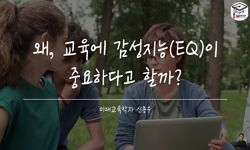This study explores how emotional education can be integrated into Korean language education policy to support international students’ long-term settlement in Korea. Amid challenges such as shrinking school-age populations, regional university decli...
http://chineseinput.net/에서 pinyin(병음)방식으로 중국어를 변환할 수 있습니다.
변환된 중국어를 복사하여 사용하시면 됩니다.
- 中文 을 입력하시려면 zhongwen을 입력하시고 space를누르시면됩니다.
- 北京 을 입력하시려면 beijing을 입력하시고 space를 누르시면 됩니다.

정주형 한국어교육 정책 분석과 감성교육의 연계 가능성 = An Analysis of Settlement-Oriented Korean Language Education Policies and the Possibility of Linking with Emotional Education
한글로보기부가정보
다국어 초록 (Multilingual Abstract)
This study explores how emotional education can be integrated into Korean language education policy to support international students’ long-term settlement in Korea. Amid challenges such as shrinking school-age populations, regional university decline, and early return of international students, there is a need for a new educational-policy model. Current Korean language education, mainly academic and functionalist in orientation, lacks emotional and civic dimensions crucial for sustainable settlement. Drawing on Nussbaum’s theory of emotions, this study reimagines Korean education to foster international students as emotional and civic participants in local communities. Using policy analysis and literature review, it examines the Regional Era Comprehensive Plan (2023–2027), the Educational Development Zone (EDZ) policy, and the Fourth Basic Plan for Immigration Policy. It also reviews key concepts such as emotional education, global citizenship education, and “settlement,” while analyzing recent Korean studies on language education and student integration. Findings reveal that existing policies insufficiently promote belonging and civic engagement. The study proposes a settlement-oriented Korean education model grounded in emotional education, emphasizing empathy, emotional literacy, and narrative imagination. This integrated approach contributes to education policy transformation and offers practical value for student retention and regional revitalization.
동일학술지(권/호) 다른 논문
-
항공사 사고 특성별 서비스 회복 전략의 비교 연구-사례 분석을 중심으로-
- 조선대학교 국제문화연구원
- 서리
- 2025
- KCI등재
-
시니어 여성의 자기관리 역량 강화를 위한 메이크업 학습모듈 개발–NCS 기반 설계–
- 조선대학교 국제문화연구원
- 박혜선
- 2025
- KCI등재
-
AI_인문사회 기반 ‘융합형 AI 인재양성’ —사회문화 변화에 대응한 학제 간 융합 전략
- 조선대학교 국제문화연구원
- 정운조
- 2025
- KCI등재
-
『표준 한국어 의사소통』 고학년 교재의 주제 구성과 문화 활동 재구성 연구
- 조선대학교 국제문화연구원
- 최정희
- 2025
- KCI등재




 스콜라
스콜라






